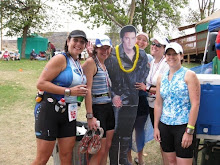From TransWorldNews
Here are 4 tips that you can use in your triathlon training to avoid plateauing.
1. Racing Too Much
There are also those triathletes who drool over the race calendar and check off nearly every weekend with competition, from sprints to Olympics to 5K's to half-marathons. Not only does this subject your body to a volume of intensity that will probably cause it to break about halfway through the year, but it also decreases your chance of ever having a really "good" race, and instead just having a large handful of mediocre performance. And those of you with families are guaranteeing that your wife or children will regret the fact that every vacation has to be a "triathlon vacation". Choose and commit to a small number of good races, then focus on excelling at those events. You'll have more medals, less injuries, and higher quality triathlon training at the end of the season!
2. Not Practicing Transitions
If you glance over the race results for any triathlon, you'll notice some individuals with smoking fast swim, bike and run times who completely lost a podium spot or a personal best because they spent an extra few minutes in transition. Those minutes can really add up. An extra 60 seconds in transition at an Olympic distance race means you'll have to run almost 10 seconds per mile faster to catch the person who was able to shave a minute. Inserting just a few "transition"practice sessions at your local beach, park, golf course, backyard or driveway will pay off. Practice both swim-to-bike and bike-to-run changes during your triathlon training. This is one area of a triathlon where you can be just as good as the pros!
3. Winging It Nutritionally
You're asking for big trouble if you're going into a race or race day with absolutely no plan but to eat and drink when you're hungry or thirsty. Not only will you have no consistency with your nutrition, but you'll have no confidence about whether you're taking in too little or too much. Not only should you write down your pre-race meal and fueling plan, but you should also go over it again and again in your head while you're lying in bed the night before the race (not to mention including it in your weeks of triathlon training leading up to the race). This mental preparation will stick with you on race day when you're deciding on whether you need to eat that extra gel, or it's just going to give you a stomachache.
4. Nutritional Rigidity
At the same time, if you decide that you're going to stick to your nutrition plan no matter what, then you could also be asking for trouble. What if it's hotter than usual and you decided not to take any salt tablets out with you on the course, or an extra water bottle? What if the bike course is easier and faster than you planned, but you still decide to try to shove in six gels during the ride? What if you planned on getting a banana at the aid station turnaround, but there are no bananas? Be ready and flexible with your nutrition plan, and these type of situations won't do as much damage to your race. Practice with differing amounts of fuel and fuel types in your triathlon training, and you'll be ready for anything.
What do you think? Are you at fault of committing any of the top eleven triathlon training mistakes? Now, skim through that list again. What can you change? Now is the time to take action!
www.rockstartriathlete.com























No comments:
Post a Comment